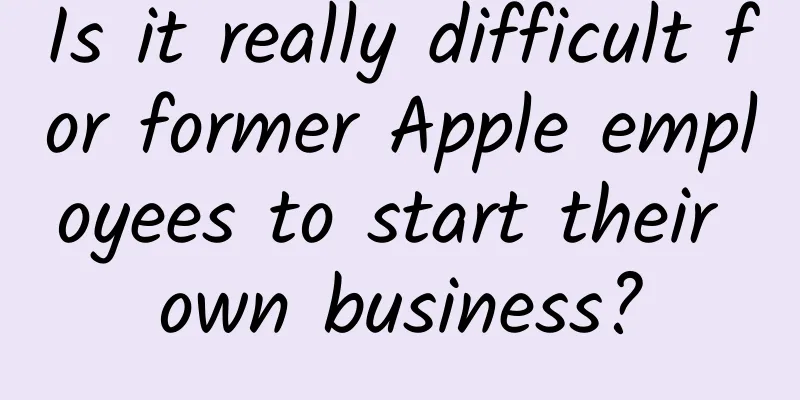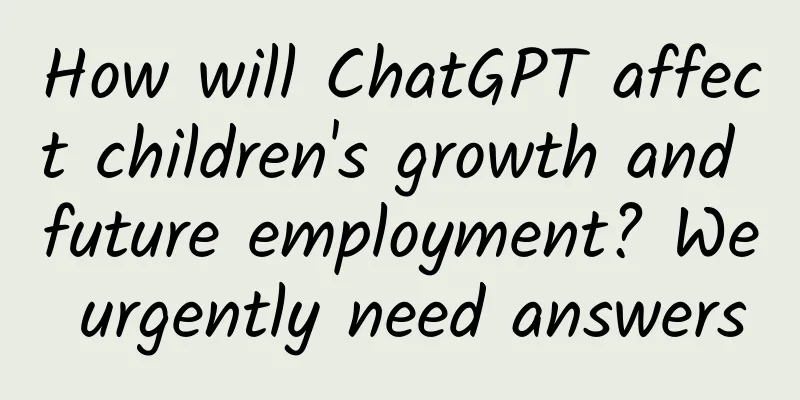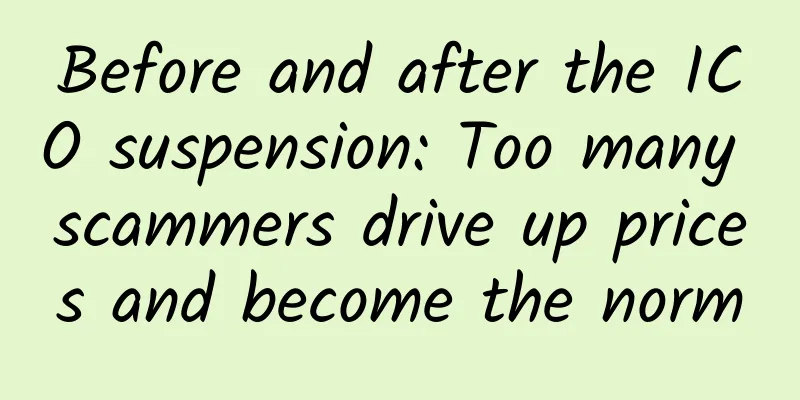Is it really difficult for former Apple employees to start their own business?

|
A Tencent reporter translated an article from MobilePhoneNews last week, pointing out that due to Apple’s “closed culture,” not only are the number of its former employees who successfully founded new companies far less than those of other companies, but also very few of them can become big companies. I forwarded it to my friend circle, and added: "It's an industry issue. What does it have to do with Apple's corporate culture?" The reason is that I feel that the original article lacks data support. But unexpectedly, the forwarding of the article in the circle of friends caused several friends who are very familiar with the famous perverted closed company "Apple" to send me private messages: "This topic is actually worth discussing." I invited them out and named them: A, B, and C. “This topic is actually worth discussing.” The first directional answer I was told was that Apple’s culture of confidentiality does have a negative impact on employees’ entrepreneurial success rate. Let me give you a simple example: On the first day of training, an employee was told that he could not tell his family what he was doing. I was surprised. But he could not tell his boyfriend or girlfriend either? How could he support the other person in his work? A: "Yes, you can't tell me. And if you are not in the same group managed by the same manager, you must get the manager's approval before communicating anything. Therefore, when Apple employees eat in the cafeteria, they often have to stop talking at a certain point. If even your family can't know what you are doing, how much will your external network be affected?" I thought about it and asked, "If someone told me that he works for Apple and can't speak, I would immediately understand and respect him. But this does not affect my regard him as a friend?" B: "But you won't be able to communicate deeply because of this." Gotcha. A: "Entrepreneurs are actually very lonely. They actually really want to communicate with knowledge elites in the same niche, and the more niche the better. For example, suppose I work on cloud storage, he works on Google Cloud Storage, and he works on Amazon Cloud Storage. In this way, when we communicate, we can understand each other very well and understand everything. But because of the extremely strong culture of confidentiality, you may lose these, resulting in the loss of high-quality connections needed for entrepreneurship during the years you work." C: "Because over time, the 'information' and the 'person' will die in you." “There may be one exception.” However, there may be another exception. This exception is: a "senior Apple executive" starts a business, and this person must be a very strong founder, and the team structure must be led by a very strong leader. A/B/C: "That is to say, first of all, he must have grown to a very, very high level and have a strong judgment of the industry (including the downstream market). Then he will say, I want to do this, I want to do that. Then he can mobilize a lot of resources by himself. In the early stage, what he needs is people who can quickly and fiercely execute his ideas." This is quite different from companies represented by Google, which can have an explosion of successful startups at every point in the "network" structure. See the case The most successful example of Apple employees starting their own business is Nest, which was acquired by Google for $3.2 billion in early 2014. I told my Silicon Valley friends that I needed data support, so we checked the company's team structure on the spot. Result: Nest's founder/CEO is Tony Fadell, look at his background: He joined Apple in 2004 as VP/Senior VP of iPod Division. We have said that there are a lot of excellent Chinese in Silicon Valley, but very few of them can reach the VP level in large American technology companies. You can imagine the significance of VP in the talent level of Silicon Valley. In fact, Tony Fadell is known in Silicon Valley as the "Father of iPod." And Nest, a company listed as a Team Member by CrunchBase, is strangely composed of VPs or below. Another case Another successful company mentioned in MobilePhoneNews is Curbside, founded by Apple employee Jaron Waldman around 2013. This company received US$8 million in Series A funding last October. Its model focuses on Local Delivery and it is well-known in California: users can buy things directly from department stores through an app and then quickly pick them up at the door of the retail store, avoiding the hassle of shopping in physical stores and queuing for checkout. This is also a representative of the current surge in investment and financing in the On-Demand model in the United States. As for its Team Member structure: in addition to Jaron Waldman as Founder/CEO, there is another Founder, Denis Laprise, who is not included in the above-mentioned "exceptions". Interestingly, my friends told me that this person is actually a little "special": He is not an Apple veteran. At first, he founded a company called Placebase, which is related to maps. Then, the company was acquired by Apple, and this person formed a team to develop Apple Maps. But after the release of Apple Maps, the response was not very good. For details on how Apple lost the battle with Google in the map industry, you can read our previous article "What model may break the WeChat model?" After that, Jaron Waldman slowly left. That is: he is not a representative figure of Apple culture. other 1) Among the successful companies founded by former Apple employees, there is actually a reader project Flipboard, which received $50 million in Series C funding in 2013. I heard last year that the project did not develop very well, of course, it is very likely related to the industry the project is in. In addition, we don’t know the team structure of Flipboard (there is only one co-founder in the CrunchBase data, and the title is just: Senior iPhone Software Engineer) and the internal story, so we did not include it for reference. 2) I have to emphasize that I wrote this article just because I thought the topic was interesting. There is really no right or wrong here. In fact, everything needs to be analyzed on a case-by-case basis. The "one-size-fits-all" experience is very unreliable. Apple culture has its own factors, such as Jobs's "personal" judgment as the founder is too strong; another example is the culture of confidentiality. Hardware is not like software, which is very easy to copy. Even if the software is copied, in a comparative sense, it has nothing to do with it. In fact, Google wants to "give" you everything it has. Because the software industry can quickly attract users, I have so many users, and these users are naturally "competitive barriers". At the same time, the more user groups use it, the faster the user barriers and ecological barriers will be built; 3) This kind of specific problem is analyzed specifically, including the narration I forwarded in the circle of friends. Very interesting: A friend of mine recently talked to me about his understanding of the "choice" of entrepreneurial projects as an entrepreneur. He said: 1. Can this thing be done; 2. Can this thing be done by "you". I think it is a great point. In fact, an entrepreneur, especially an entrepreneur who is starting a business for the first time, tends to choose a field that matches his knowledge structure and resources. The hardware field is a bit special. It is not easy to create a "big thing" that shakes the world. It requires resources and control over the upstream and downstream industrial chains. This is also related to the viewpoint that a good friend of mine discussed with me last time. He had experienced the rise of Facebook: "Enterprise-level applications actually require founders to have very high industry resources, so you will see that in the US consumer-level products, very young people often drive the entire market with product-driven products. However, enterprise-level projects require too strong industry resources. No matter how good the product sense of young graduates is, it is difficult for them to drive the market." |
<<: Lei Jun's message to Xiaomi's followers
>>: Debug your code like a doctor
Recommend
How to write a new media marketing promotion plan!
What role does new media marketing play? How to s...
Beauty is in the eyes of the beholder? The secret lies in the difference in aesthetics
We often say "Beauty is in the eyes of the b...
Alibaba Mini Program Customization Company, how much does it cost to customize a hotel mini program?
What is the price for customizing the Ali Hotel m...
Chan Tui Decoction helps you sleep, while Danggui Huangqi Wolfberry Drink treats dysmenorrhea. Can the “ancient recipes” in Meng Hua Lu be used today?
Recently, the popular TV series "Dream of Sp...
iPhone accounts for 86% of global profits
Michael Walkley, an analyst at U.S. investment fi...
It's a great diver and a great fisherman! How does the common cormorant dominate the water?
Have you ever seen a black water bird by a river ...
Why can't you get your tan back? It must be because you didn't do these things! The last trick is the most important!
In the hot summer, more and more fairies like to ...
Are modern people obsessed with pets? Little do people know that ancient people were also crazy about pets~
According to the data from the "White Paper ...
How to build an internet celebrity brand?
Here, I would like to talk further about how to b...
After getting the medicine prescribed at a big hospital, should the community clinic help with the injection?
Recently, there was news that an elderly man was ...
Online marketing promotion: How to use H5 activities for brand promotion!
An H5 product needs to be carefully polished, but...
Beijing Folding Award once again triggered AI fever: Will artificial intelligence be an angel or a devil in the future?
On August 21, after Liu Cixin, a famous science f...
What happened to Mulan being withdrawn from theaters again? When will Mulan be released after being withdrawn from theaters?
What happened to Mulan being withdrawn from theat...
Birds are "master ventriloquists" who can even imitate the sounds of other animals
Produced by: Science Popularization China Author:...
How to get the new version of AppStore traffic bonus before iOS11 is released
Introduction: For APP promotion and operation per...









